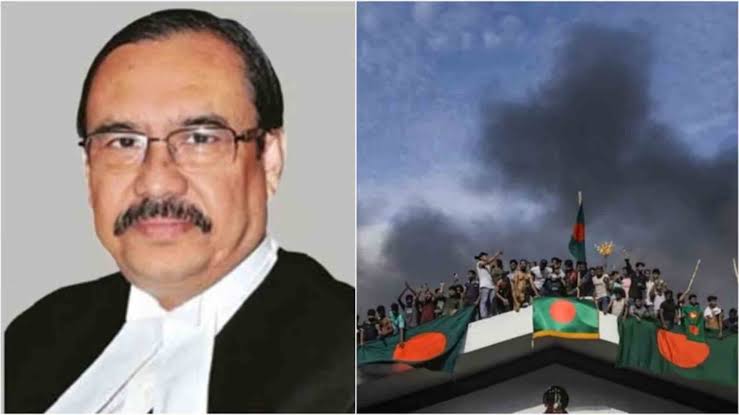Bangladesh’s Chief Justice Resigns Amidst Protests as Interim Government Begins
Bangladesh’s Chief Justice, Obaidul Hassan, resigned on Saturday amid escalating protests, as the country’s newly formed interim government began its work. This development follows the resignation and flight of Prime Minister Sheikh Hasina to India after a mass uprising.
Asif Nazrul, the adviser for law, justice, and parliamentary affairs to the interim government, confirmed via a Facebook video that the resignation letter had been received and would be forwarded to President Mohammed Shahabuddin for further action.
Later that day, five other top Supreme Court judges also resigned, signaling the new government’s intention to reorganize the judiciary. Tensions had risen earlier when the Chief Justice convened a meeting of the High Court and Supreme Court judges to discuss judicial operations under the interim government, prompting protesters to gather outside the court and demand the resignation of all top judges.
Key student leader Asif Mahmud, recently appointed as an adviser to the Ministry of Youth and Sports, urged supporters to join the protest outside the court to demand the unconditional resignation of the judges. The students have insisted that the judiciary should operate independently, free from political influence.
Tahsim Uzzaman, a 26-year-old governance and English literature student, voiced the protesters’ concerns: “We believe these justices have favored the previous government and have been complicit in its corruption. We seek a judiciary free of corruption, in line with the movement’s goal of eliminating discrimination.”
The interim government, led by Nobel laureate Muhammad Yunus, was formed after President Shahabuddin dissolved Parliament and appointed a new cabinet, which includes civil society members and student protest leaders. Yunus was in Paris for the Olympics when selected for the role.
On Saturday, Yunus visited the family of Abu Sayeed, a student whose death in Rangpur became a rallying point for the protests. Sayeed’s defiant stance before his death, captured on video, quickly spread across social media, fueling nationwide unrest. Yunus, accompanied by student leaders, emphasized the need for unity, saying, “We must all protect the rights of our citizens as Abu Sayeed did.”
The protests, initially sparked in July over a controversial government job quota system, evolved into a broader movement against Hasina’s government. The unrest has resulted in over 300 deaths, including students and police officers.
The interim government, which aims to bring about reforms, is expected to announce new elections. However, the timeline for these elections remains unclear, with the main opposition party calling for them to be held within three months.


